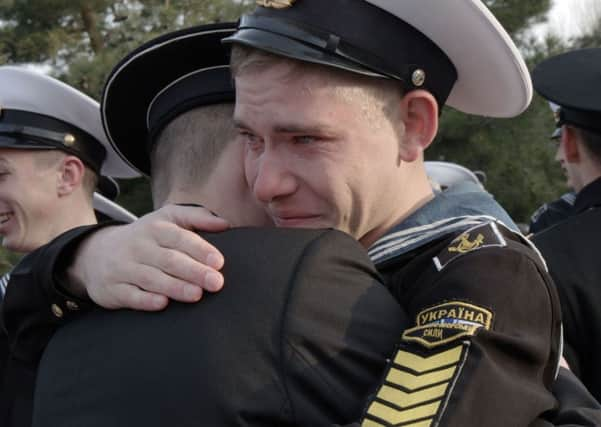Thousands of Ukraine troops ‘ready to defect’


Russian defence minister Sergei Shoigu confirmed the move, as tensions remain high between the two countries, with the superpower doubling the price of gas to place pressure on Kiev.
The Black Sea peninsula was annexed in March after Crimea residents voted overwhelmingly to seek to join Russia.
Advertisement
Hide AdAdvertisement
Hide AdThe referendum was called two weeks earlier, coinciding with the military occupation of the region by armed men in unmarked uniforms.
Mr Shoigu described claims that the Russian army has mistreated Ukrainian servicemen as “improper and provocative”.
Several senior Ukrainian officers, including a military base commander, were briefly detained by the Russian forces and kept in custody for several days.
He said that all Ukrainian forces had been free to return to their country but that many had stayed to serve with the Russian Federation.
Moscow has never admitted that the thousands of troops roaming the peninsula, seizing airports and putting up road blocks, were in fact Russian.
They wore no markings and had masks but some drove armoured personnel carriers with Russian number plates.
In what seemed a cautious acknowledgment of Russian military involvement, Mr Shoigu said Crimea faced “a threat to civilian lives and the threat of a seizure of the Russian military infrastructure by extremist organisations”, so Russia “took decisive actions” and “beefed up security of Russian military infrastructure in Crimea”.
He stopped short of giving details but said the military had “managed to prevent bloodshed”.
Advertisement
Hide AdAdvertisement
Hide AdMr Shoigu said Russia’s actions did not violate any international laws because Russia had never exceeded the agreed amount of troops stationed on the peninsula.
Relations between Ukraine and Russia have turned hostile since popular protests in Kiev ousted pro-Russian president Viktor Yanukovich in February.
Ukraine and western powers did not recognise the March vote in Crimea and protested against the Russian annexation.
Mr Shoigu’s comments came as Ukrainian prime minister Arseny Yatseniuk hopes Europe can reverse gas down its existing east-to-west pipelines to help counter “political” price hikes in the gas Kiev gets from Moscow, but it could take until next winter to make the adjustments needed for significant volumes.
Ukraine is desperate to break free from its reliance on Vladimir Putin’s Russia. Moscow raised its discounted gas tariff for Kiev twice this week, almost doubling it in three days – and Mr Yatseniuk now fears Russia could also restrict gas supplies.
European pipelines are built to pump gas east to west – but building a compressor station on the western side can drive a limited amount of gas eastward.
This would allow Ukraine to receive gas from producers such as Slovakia, using the same pipelines it already has.
The European Union has encouraged member states to build such stations after previous gas crises involving disruption of Russian gas supplies.
Advertisement
Hide AdAdvertisement
Hide AdFive billion cubic metres a year can already be pumped to Ukraine through Hungary and Poland, but that is just 8 per cent of Ukrainian demand. The biggest potential link is via Slovakia, which can provide enough to meet 35 per cent of Ukraine’s demand.
Ukraine and Slovakia began talks on the issue in Brussels last month, and European energy commissioner Guenther Oettinger said he hoped a deal could be reached by the end of this month.